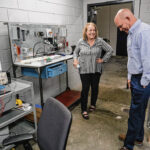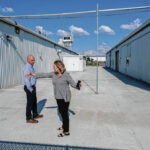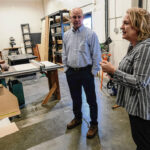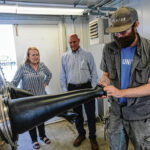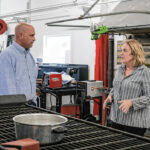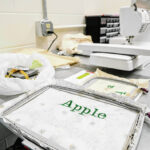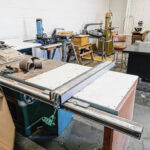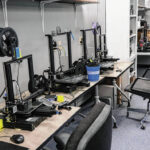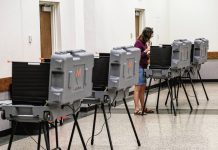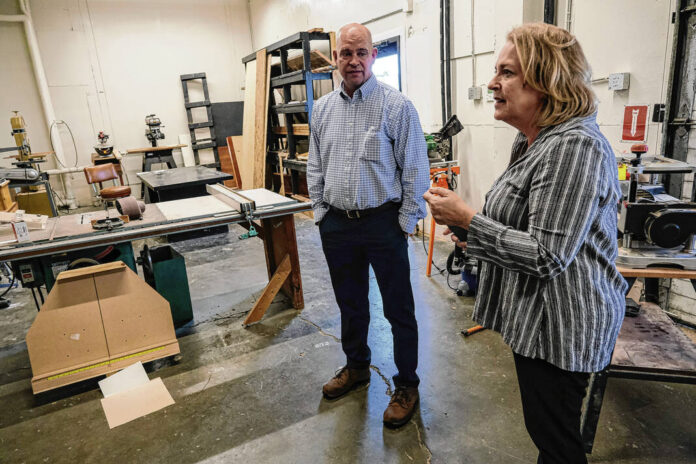
Mike Wolanin | The Republic Cindy Frey, right, shows Kurt Schoenegge around Propeller makerspace at the Columbus Municipal Airport in Columbus, Ind., Wednesday, Aug. 17, 2022.
A local makerspace is continuing to grow and expand its horizons — and will be able to do so for at least a few years, with an $580,000 economic development grant from the state.
Columbus Propeller Board President Bryan Rushton and Columbus Area Chamber of Commerce President Cindy Frey recently updated the Columbus Redevelopment Commission on the center’s progress.
Propeller has been described as a place for both “makers” and entrepreneurs. It is located in two buildings that are owned by the Columbus Municipal Airport and were previously occupied by Cummins, Inc, which had used the space for testing engines.
“This is a community innovation center — a place for training, enrichment and exploration,” said Frey.
Propeller has labs for 3-D printing, robotics, electronics, metalworking and woodworking. There are also spaces for start-up support and STEM classes.
A $580,000 Regional Economic Acceleration and Development Initiative (READI) grant has been approved for the makerspace. Propeller has not received these funds yet but has completed all of its paperwork and submitted its first request on Aug. 15.
She said in her presentation that READI’s funds will support Propeller in its “three-year pilot phase.”
“We’ve got a three-year runway with the money we earn and then the money we will pull down from IEDC’s (Indiana Economic Development Corp.) READI grant to support our training and some of our overhead and our new equipment purchases,” said Frey. “We’ve got a really good runway to at least see if this is going to be something that the community wants to continue to adopt and support.”
The redevelopment commission provided some of that support in the past, with members voting in August of 2021 to grant $150,000 from the airport’s Tax Increment Financing district to help the makerspace fund facility improvements.
“We were concerned about the poor drainage that was pushing water into the building after heavy rain,” said Frey. “The concrete was crumbling and had sort of been patched with asphalt. And it was just altogether pretty dingy and not very friendly with the fence there.”
The commission’s funds went toward items such as concrete work, moving HVAC units, improving safety and access to the buildings and enhancing connectivity.
“We’re very grateful for the boost you gave us,” Frey told the commission.
“Absolutely,” said Rushton. “We think it’s been transformative to allow us to basically get a clean slate, and now we can go in and start to fill that with the interest from the community. So I think we think that we’re going to be harvesting the investment for a lot of years to come, so greatly appreciate that. And if we ever outgrow the space, fingers crossed, there is the opportunity to continue harvesting investment in this facility based on the improvements we’ve made.”
Propeller recently expanded its hours and has become “much more lively” as membership grows, said Frey. Sixty people have signed up through its website.
“Ivy Tech has agreed to be our partner in staffing the building with a learning instructor and a lab tech,” she added. “We’ve got a job description we’re ready to post.”
Frey and Rushton also noted in their presentation that Perpetua Technologies, a start-up focused on alternative energy, has installed a new lab at Propeller.
The company recently participated in the third cohort of the gBETA Bloomington-Columbus program, which provides support for early-stage startups. As stated in the company’s description, Perpetua “harnesses the power of calcium ion energy in motion through innovative packaging that creates cheaper, longer lasting, and more environmentally friendly alternatives to lithium battery technology.”
Company leadership includes co-founder and CEO Eric Silver.
“This young man was in Bloomington,” said Rushton. “He had a lot of different places he could’ve really focused where he put down roots for his business. And in part because of Propeller, he’s chosen Columbus to really try to make this push in what he believes will be transformative technology in the battery-electric industry.”
There are also a few projects going on that focus on the makerspace’s exterior. Propeller has engaged Landscape, Art and Architecture (LAA) Office to help enhance the facility’s outdoor spaces, said Frey. This could potentially include shade, landscaping, work tables and signage. There have been two work sessions with LAA Office so far, and a third is scheduled for September.
The hope is that this will result in “beautiful drawings and some really compelling ideas” to show the community. They would then look to launch a crowdfunding campaign through Patronicity, with a matching grant from the Indiana Housing and Community Development Authority.
“We’ve submitted a grant for a greenhouse on the property,” added Frey. “We’ve got a lot of outdoor space, and we’ve had some interesting parties come to us with a desire to do some things around agriculture. And we think there’s even a possibility to sort of marry up what happens in ag and tech in some interesting ways.”
Mike Wolanin | The Republic Cindy Frey, left, shows Kurt Schoenegge around Propeller makerspace at the Columbus Municipal Airport in Columbus, Ind., Wednesday, Aug. 17, 2022.
Mike Wolanin | The Republic Cindy Frey, right, shows Kurt Schoenegge around Propeller makerspace at the Columbus Municipal Airport in Columbus, Ind., Wednesday, Aug. 17, 2022.
Mike Wolanin | The Republic Cindy Frey, right, shows Kurt Schoenegge around Propeller makerspace at the Columbus Municipal Airport in Columbus, Ind., Wednesday, Aug. 17, 2022.
Mike Wolanin | The Republic Cindy Frey, from left, and Kurt Schoenegge watch Matteo Auteri demonstrate how to use a glove box at Propeller makerspace at the Columbus Municipal Airport in Columbus, Ind., Wednesday, Aug. 17, 2022.
Mike Wolanin | The Republic Cindy Frey, right, shows Kurt Schoenegge around Propeller makerspace at the Columbus Municipal Airport in Columbus, Ind., Wednesday, Aug. 17, 2022.
Mike Wolanin | The Republic A view of a seamstress station at Propeller makerspace at the Columbus Municipal Airport in Columbus, Ind., Wednesday, Aug. 17, 2022.
Mike Wolanin | The Republic A view of the wood shop in the Propeller makerspace at the Columbus Municipal Airport in Columbus, Ind., Wednesday, Aug. 17, 2022.
Mike Wolanin | The Republic A view of the 3D printing lab at Propeller makerspace at the Columbus Municipal Airport in Columbus, Ind., Wednesday, Aug. 17, 2022.

